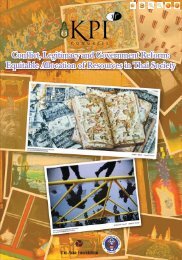SUFFiciENcy EcONOMy ANd GRASSROOtS DEvElOPMENt
SUFFiciENcy EcONOMy ANd GRASSROOtS DEvElOPMENt
SUFFiciENcy EcONOMy ANd GRASSROOtS DEvElOPMENt
Create successful ePaper yourself
Turn your PDF publications into a flip-book with our unique Google optimized e-Paper software.
The Meaning of Sufficiency Economy <br />
International Conference<br />
215<br />
The Village Economy: Capitalist AND <br />
Sufficiency-based – A Northeastern Thai Case 1<br />
<br />
<br />
<br />
INTRODUCTION<br />
The 1997 crash of the Thai baht and the subsequent economic crisis was,<br />
without question, a major watershed event in the economic history of modern<br />
Thailand. In his book, Thailand at the Margins: Internationalization of the State and<br />
the Transformation of Labour, Jim Glassman concluded that the economic crisis of<br />
1997 demonstrated that the Thai economy “having been ‘opened’ and integrated into<br />
the rhythms of global capital accumulation over the course of more than a century”<br />
had come to experience “volatility in virtually full force” (Glassman 2004: 203).<br />
This volatility has led to a heightened sense of insecurity especially for those who<br />
have limited resources to weather the radical shifts in prices, wages, or access to<br />
capital. In Thailand those with the greatest sense of insecurity are those from rural<br />
areas who depend on selling their agricultural products or finding wage labor in<br />
factories or other forms of work in urban areas.<br />
The consequences of the volatility of the economy were profoundly felt in<br />
Thailand in 1997. The economic crisis which took place left many urban people as<br />
well as villagers in quite dire straits. In his birthday speech in December 1997 King<br />
Bhumipol Adulyadej expressed his deep concern for the people of the country who<br />
were in trouble because of the crisis. 2 He proposed that if his subjects would<br />
practice a “sufficiency economy” (sêthakit phôphiang), “even fifty percent, <br />
but perhaps only twenty-five percent” the crisis could be made bearable. The King<br />
proposed that the people of the country should embrace practices which accentuated<br />
practices of cooperation and self-reliance to provide for their basic needs rather than<br />
depending on markets that were subject to the insecurities of the global capitalist<br />
economy.<br />
The King’s philosophy has antecedents in what had previously been known as<br />
“Buddhist economics.” This term was the title of a chapter in a book, Small Is<br />
Beautiful by the economist E.F. Schumacher. Schumacher (1973: 58) argued that<br />
1<br />
This paper was presented as a keynote address for the 10 th International Thai Studies<br />
Conference, Thammasat University, Bangkok, January 2008. The public presentation of the paper<br />
included many photos, but only a few are included here. The paper is still a work in progress and<br />
comments are very welcome.<br />
2<br />
An English translation of the King’s speech can be found on line at http://kanchanapisek.or.th/<br />
speeches/1997/1204.en.html.














